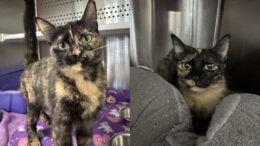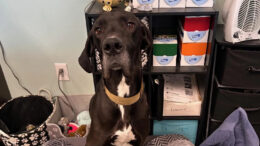
Nova is a 1-year-old husky mix available for adoption through Precious Paws Animal Rescue group of Franklin.
Precious Paws Animal Rescue group of Franklin has offered these tips to help readers choose the right pet.
Is your family considering adopting a pet? Where to begin on your search is the question. Bringing home a new pet doesn’t affect only one person it affects the whole family. Everyone should be involved in the process. Do you have any other pets in your house? Does anyone have allergies? Will someone be around to take care of this pet?
The first things to consider in choosing the right pet are:
* How long pets live … pets are a big responsibility.
* What kind of pet do you want to own? The first step is to do some research on the average life span of your new family member.
* Dogs can live 10-15 years
* Cats can live up to 20 years
* Pigs can live 12-20 years
* Horses can live up to 30 years
* Some birds and reptiles may even out live you and may need to be included in your will.
The next steps after you choose the type of pet that is suitable for your family are to consider these important factors:
* Look at your living space — is it too small; do you live in a high-rise or have a back yard that an animal can run and play? You may not want to add a large pet to your family if you live in a small apartment with no outdoor space.
* Do you have the time to care for this animal? If you choose an aquarium for instance, do you have time to test the water to keep your fish healthy and do you have the knowledge to be a suitable pet owner for fish?
* Do you have enough room for this animal? Does the animal take up a lot of space or produce an odor that you may want a separate area to house them? For instance, a pet snake may grow to be very large and need an extra big tank or cage for its habitat. Pot Belly pigs will grow up to 200 lbs. There is no such thing as a micro pig that will remain small; this is a marketing myth or a genetic defect.
* Can you and your family give this animal what it needs? Does it need to be walked a lot, need a lot of grooming, or lots of daily chores done for it? Such as cleaning its cage or keeping the environment appropriate. If you are not an active person, an active breed of dog such as a border collie, Labrador or Australian Shepherd might not be a good idea. If you are looking at livestock, check your zoning before purchasing the animals — some municipalities allow chickens but not roosters (due to noise).
* Can you afford the cost? There is no such thing as a free pet. Even if you obtain the animal for free, don’t forget about veterinary costs, food and other expenses. Pets can be very costly. Consider the monthly cost of your pet before choosing the best fit for your family. Adopting an animal from a reputable rescue may be more economical in the long run because the animal will be vetted and health checked before you adopt it.
* Will my lifestyle change in the future during this pet’s lifespan that might create problems later on? If you get a dog as a college student, you will have this dog through your career changes, possibly marriage and relocation. Also, if you adopt a dog that is not good with children when you are 25, you need to consider if children are part of your plans for the next 15-20 years.
Health issues:
* Keep in mind the activity level of a pet and if you are able to keep up with them.
* Research inherent health issues in the pet you are interested in. Large breeds such as German Shepherds tend to have hip dysplasia. Dogs with pendulous ears, such as Bassett Hounds, need frequent cleaning of their ears to prevent ear infections. Boxers, Boston terrier, Bulldogs, and other smushed face breeds, may have inherent breathing difficulties due to their physiology.
* Don’t forget about allergies when choosing your new addition to the family. You don’t want your family to fall in love with your new pet only having to return it later due to allergies. It is very important to do your research first before you put yourself into that predicament. No one wants to have to return a beloved pet. The only dogs that do not shed are poodles and bichon frises. Designer dogs, such as cockapoos, are not necessary non-shedding. There is no such thing as a hypoallergenic dog.
Teach your child how to care for the pet:
* Parents are the main caregivers. As a parent even though you want to teach your child how to care for this pet; you need to be prepared to also be the main care giver.
* Take responsibility — Encourage your child to be part of the process. Ask them to take part in selecting the bed, crate or cage. Talking about the animal’s need to be walked or taken outside frequently, or cleaning its cage.
* Children are still children and need to be supervised around all pets. Many children are bitten each year by pets who have given many signs and body language that they were uncomfortable with the child. Never allow children to pull pet’s fur, ride them or put their face in theirs. Dogs misinterpret these behaviors differently than people.
* Group consensus — Picking out names and who is going to be responsible for what duties concerning the animal. Make a pet care calendar. It can show who is doing which daily chores.
The most common pets that families choose are typically dogs and cats. The top 5 best dogs for children are as follows:
* Beagle — has a happy-go-lucky, friendly personality. They love to play and this playful personality is what makes them a great child-friendly dog.
* Pug — this outgoing dog is a small bread that is great with children and is very loyal. Its small size is great for apartment living.
* Labrador — this breed is very familiar and has been a favorite in the U.S. for many years. They are patient by nature, patient with young children and are the most loyal dog you will ever meet.
* Golden Retriever — This breed is very similar to the lab. They may even have a bit more energy than the lab. Very trainable if done early and can learn over 200 commands. Very good with children and also a loyal dog.
* Standard Poodle — This breed is very good for a family, especially if there are allergies in the home. They are very patient, easy to house break and highly intelligent. This breed is a family dog instead of a one owner dog. They love to play for hours on end.
Reptiles — you will want to be careful because they produce salmonella. These include but not limited to corn snakes, bearded dragons, geckos and pythons.
Birds — These pets are not bad if you have a cat free home and children just want to watch. Birds have powerful beaks and sharp talons, capable of breaking fingers. They also live a very long time, up to 80 years is not uncommon.
This list is not all inclusive and is not meant to discourage a particular animal, but rather to encourage thoughtful consideration and preparation before adding a pet to your home. Shelters and rescues are filled with animals who need loving homes.
More about Precious Paws
More information about Precious Paws is available on the group’s website at pparfranklin.com, by calling (814) 671-9827 or emailing adoptpreciouspaws@gmail.com.
Precious Paws operates a low-cost spay neuter clinic for dogs and cats in Franklin. The SNYP clinic is running a special for May. Prices are a $35 male cat neuter special, which is $10 off regular prices. The clinic is available Tuesday, May 3, and Friday, May 6. More information is available at www.facebook.com/SNYPVenango.
The SNYP clinic is also in need of some supplies according to a Facebook post.
“We need paper towels, toilet paper, white plastic bags, disinfecting wipes, disinfecting cleaners, such as simple green. If you are able to make a donation you can bring it to the SNYP clinic at 720 Atlantic Ave., or it can be dropped off at Penny Haylett-Minnick’s side porch. If you drop the items at Penny’s please mark the things for PPAR or SNYP. As always we are always in need of cat and dog food, both wet and dry, and cat litter,” the post said.
Adventurous soul
Eugene, a domestic medium hair, is a 2-year-old neutered male. This handsome black and gray tiger has some white on his face and almond-shaped yellow eyes. He’s friendly, curious and likes to explore. As soon as the door to his condo is opened, Eugene is looking for adventure. He had a good time exploring the cat playroom. Eugene is very playful, but sometimes he can play rough and shouldn’t be around children under 12.
She’s a princess
Tiara, a domestic medium fair, is a 2-year-old spayed female. She has an attractive calico and white coat and pale green eyes. Tiara enjoys company and being petted. Gentle and up to date on all her shots, this little lady has it all. She’ll not only delight you but also help you relax at the end of a long day. Don’t put it off. Stop and see Tiara today at the humane society.
The Venango County Humane Society is open from noon until 5 p.m. Mondays through Saturdays. It is located at 286 S. Main St., Seneca.
All animals adopted from the shelter are already spayed or neutered, which the law requires people to have done upon adoption.
More information about the humane society is available by calling (814) 677-4040 or online at venangocountyhumanesociety.org.
Meanwhile, the Venango County Humane Society was presented with the Golden Shovel Award by the Franklin Area Chamber of Commerce. Venango County Humane Society president Amber Martino represented the society at the awards dinner.
Love for Libby
Little Libby was brought to Tri-County as a stray; she may be less than a year old and is about 30 to 35 lbs. Libby has the gentle face and demeanor of a black Lab but she tiptoes and steps lightly across the yard, gazing around her with the intelligent watchfulness of a Border Collie. Libby is understandably shy and uncertain right now, but bonds quickly with those who earn her trust. With the right person, she will make an amazing partner in dog school or agility training. Libby is waiting for someone who will treat her like a cherished family member and not just another dog – someone who understands her need for respect, partnership, trust and love.
Left behind
Mickey is just under a year old. He was left behind when tenants moved. He is very friendly and loves being petted. He will be neutered soon.
If you would like to make Libby or Mickey a special part of your family, contact Tri-County Animal Rescue Center on Facebook, call (814) 918-2032, or email: contactus@Tricounty-arc.org.
The center is located at 9562 Route 322, Shippenville, and is open from 1 to 4 p.m. and 6 to 8 p.m. Tuesdays through Fridays and from noon to 3 p.m. Saturdays and Sundays.
Age is just a number
This time of year is when there are lots of cute and cuddly kittens looking for homes. Here at the PAWS house we have some kittens, but our adults are also looking for homes.
Marty has been at the PAWS house for almost 2 years. He is a sweet older cat who loves to lounge in the sun and take those much needed cat naps. Don’t think that because of his age he doesn’t love to play with his roommates and all those fun toys people donate.
Mario has come a long way since he came to the PAWS house a few months ago. He was part of the 4th avenue relocation project. He used to be shy, and now he is one of the first to greet you in his room. His eye is scarred from his time outside but that just gives him some extra character.
Bear was found in a feral colony, and if you have met him you know he is far from feral. Bear’s dream home is where he has a lap to sit on all day long, and no one to share that lap with. This big boy wants all of his furrever family’s love to himself.
Clarion PAWS is located at 11348 Route 322, Shippenville, Clarion River Hill, between Scrap Happy and Clarion Electric.
The adoption center is open from 5 to 7 p.m. Mondays through Thursdays and from 1 to 4 p.m. Saturdays. The center is closed Fridays and Sundays.
More information is available online at www.clarionpaws.org, the group’s Facebook page or by calling (814) 229-1231.
DukeFest adds vendors
Vendors keep rolling in for DukeFest. The event currently has 13 vendors signed up for the Saturday, Sept. 10, event.
Regular vendor space is free, however, a donation of approximate $15 in product for the DukeFest raffle is appreciated, organizers said.
Vendor applications should be submitted by Friday, Sept. 2.
Vendors should take their own tents, canopies, tables, chairs and whatever they need for setup. There is a $20 fee for electric which must by paid to DukeFest by Aug. 20. More information and applications are available by contacting Amber Martino at aamartino@verizon.net or (814) 673-2808; Mieke Heffern at mjheffern@yahoo.com or (814) 437-0928; Penny Minnick at dukermandog@gmail.com or message organizers through Facebook at DukeFest Dog Walk.
The fifth annual dog walk benefits local non-profit animal rescue and response groups.
More information about DukeFest is available on the group’s Facebook page DukeFest Dog Walk.
Dog wardens to canvass region
Dog wardens will canvass homes throughout Venango County during last two weeks in May. Wardens will be ensuring all dog owners have current licenses and rabies vaccinations for their dogs. Venango County is part of the Pennsylvania Department of Agriculture’s region one jurisdiction which also includes Crawford, Erie and Warren counties.
Wardens will be canvassing homes in Warren County beginning this week and Crawford County in early May.
The Department of Agriculture reminds dog owners that a license is one of the best ways to be reunited with your dog if you were to become separated.
Under Pennsylvania law, all dogs three months or older must be licensed by Jan. 1 of each year. The fee is $6.50 for each spayed or neutered dog and $8.50 for other dogs. Older adults and persons with disabilities may purchase a license for $4.50 for spayed or neutered dogs and $6.50 for others.
Additionally, all dogs and non-feral cats, three months of age and older, must be vaccinated against rabies. Booster vaccinations must be administered periodically to maintain lifelong immunity.
Violators can be cited with a maximum fine of $300 per violation plus court costs.
Venango County dog licenses may be purchased through the Venango County treasurer’s office, located in the courthouse annex at 1174 Elk St. in Franklin.
The treasurer’s office can be reached by calling (814) 432-9521.
On the wild side
Skye’s Spirit Wildlife Rehabilitation Center in Harrisville reported taking in more squirrel babies.
“Please try to do tree work when wildlife isn’t using the trees for homes. If the tree has to come down, please check carefully before you cut! If birds are nesting in the tree … legally, you have to wait until the birds fledge BEFORE you remove it,” a post on the center’s Facebook page said.
Donations for the animals’ care can be sent to Skye’s Spirit Wildlife Rehabilitation Center, 889 Farren Surrena Road, Harrisville, Pennsylvania 16038.
More information about the center is available by calling (814) 786-9677 or online at www.skyes-spirit.com.
Pet and farm blessing
A pet and farm blessing will be held at 3:30 p.m. Sunday, May 15, at Baytree Farm on Rockland Nickleville Road and Route 38 in Emlenton.
The Rev. Karen Parsh, of St. Paul’s Lutheran Church in Knox, will bless all of the animals and farms.
Is there any truth to ‘crazy cat lady’ nickname? Study says maybe
(Editor’s note: As an owner of five felines who regularly handles litter clean up, this story scares the crap out of me — pun intended. I guess the moral of the story is wash, wash, wash your hands.)
PHOENIX (TNS) — Cats have always been that furry friend that provide a form of stress relief and companionship. But a new study links them to the exact opposite.
Researchers from the University of Chicago have found cats may potentially cause a psychiatric disorder in humans.
“It freaks me out,” said Phoenix resident Theresa Rink, who owns four cats. “(The study) makes me wonder. You want to know more about it.”
It all starts with the cat’s poop. Toxoplasma gondii is a parasite commonly found in cats that is passed to humans through cat feces. The parasite can cause toxoplasmosis, a relatively harmless infection, according to ScienceDaily.
“It is a parasite that cats get from hunting and eating animals. They ingest it from the animal and pass it in their feces,” said Dr. Judy Karnia, a veterinarian at the Scottsdale Cat Clinic.
The researchers found the connection between toxoplasmosis and intermittent explosive disorder – a psychiatric disorder with symptoms such as impulsive verbal and physical aggression, like road rage.
The study involved 358 adults and suggested the parasite may change brain chemistry. Intermittent explosive disorder is thought to affect “as many as 16 million Americans, more than bipolar disorder and schizophrenia combined,” according to ScienceDaily.
Dr. Daniel Foy, a clinical professor at the veterinarian school at Midwestern University in Glendale, wasn’t connected to the study. However, he’s familiar with toxoplasma.
“Toxoplasma can invade and affect other areas of the body,” he said. “Certainly, muscular, nervous system, brain, are all areas that theoretically can be involved.”
Every time you clean the litter box, you’re at risk of getting toxoplasmosis.
If you don’t properly wash your hands after changing the litter box, you can ingest it by putting your hands around your mouth.
The parasitic disease becomes a big concern for pregnant women.
“In people, it has been associated with affecting the placenta and potentially causing abortion,” Foy said. “So one of the reasons the advice often given is to ask women who are pregnant to not clean the litter box.”
But there is good news: The lead researchers for the study said there is no reason to get rid of your cats just yet, and researchers must do more studies to understand the connection to the explosive disorder.
Washing your hands, changing the litter box daily and using gloves are all ways to help ensure you don’t get toxoplasmosis.
Although, who knows? You might already have it. An estimated 60 million people already do, according to the Centers for Disease Control and Prevention. But, in most cases, there are no real health concerns.
(All About Animals is a weekly blog that appears on Venangoextra.com and Clarionextra.com. Interested persons or groups can submit information to bigdogs.thederrick@gmail.com. More information about the blog is available by contacting Anna Applegate at 814-677-8364.)













































